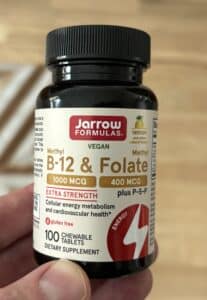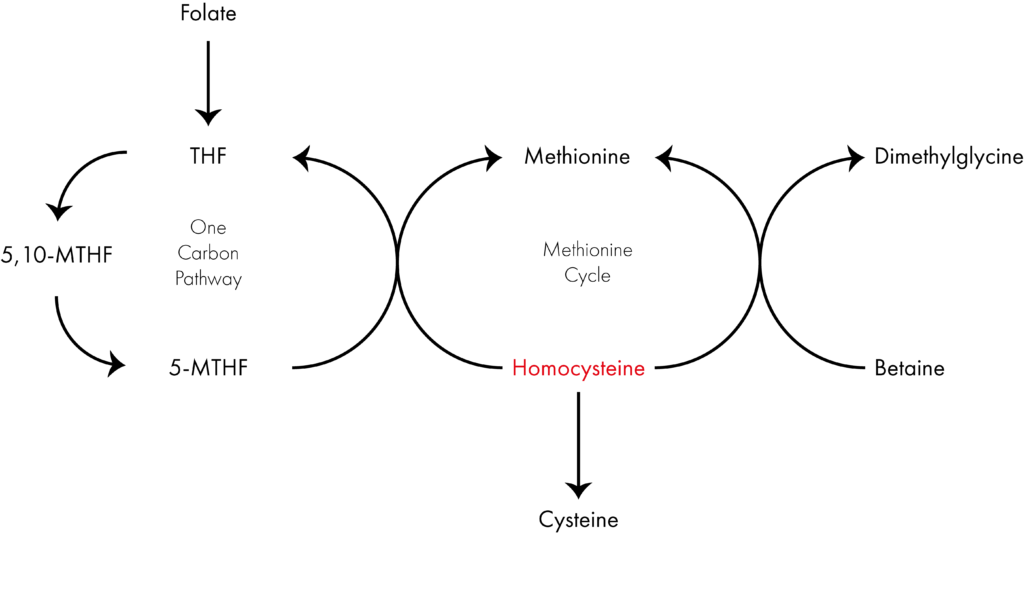Methylfolate Side Effects Are Common: Here’s Why
Article at a Glance
- Methylfolate is the biologically active form of vitamin B9.
- Taking too much methylfolate can cause side effects, such as severe anxiety, nausea, insomnia, migraines, irritability, achy joints, headaches, and more.
Genes Mentioned

Contents
Methylfolate supplements can come with side effects, even if you “have MTHFR.”
A nontrivial percentage of the population cannot convert adequate amounts of folate, an important B vitamin, to methylfolate, often due to MTHFR gene variants, and other SNPs that affect the methylation cycle. 1
For example, according to the International Journal of Cancer, 35% of the North American population carries at least one copy of the risk allele for C677T:
The MTHFR C677T polymorphism, which results in an alanine to valine substitution, is a common variant with an allele frequency of about 35% in the general North American population, and occurs frequently among Caucasian and Asian populations, with rates of ~12%-15% for individuals who are homozygous for the variant…
Int J Cancer, 2009 May 1

Those who carry an MTHFR variant are often told they should supplement with methylfolate (5-MTHF) and avoid folic acid, which is the synthetic form of B9 often found in fortified foods. This isn’t bad advice, especially for the estimated 12-15% of the population that is homozygous for C677T.
It’s true that methylfolate has been used as complementary medicine in several recent clinical trials, but the role of B vitamin supplements in health is oversold by many functional health practitioners, including Gary Brecka. 2 3
Dialing in the dose with any methylfolate supplement is a key driver of success, and it does not follow that more is always better.
People may feel better after supplementing with methylfolate for a short time, simply because they’re nutritionally deficient. However, just because you get an initial boost, it may not be appropriate to continue taking large doses, especially long-term.
Supplementation with methylfolate bypasses the MTHFR enzyme altogether, thereby enhancing methylation reactions regardless of the presence of genetic variations that interfere with metabolism.

Get Started With Personalized Nutrition
Gene Food uses a proprietary algorithm to divide people into one of twenty diet types based on genetics. We score for cholesterol and sterol hyperabsorption, MTHFR status, histamine clearance, carbohydrate tolerance, and more. Where do you fit?
What is L-Methylfolate (5-MTHF)?
Methylfolate is a vitamin that is part of the vitamin B family, specifically, it’s the biologically active form of vitamin B9, meaning that methylfolate is the form that the human body can absorb and use fully after ingestion. It goes by several other common names including:
- L-Methylfolate calcium (refers to the calcium salt molecule it is attached to)
- 5-methyltetrahydrofolate
- (6S)-5-methyltetrahydrofolate and Quatrefolic.
- 5-MTHF and L-5-MTHF (in this article 5-MTHF refers to L-5-MTHF)
- Metafolin and Deplin
- Levomefolic acid
- Methylfolate
Be aware of the fact that some products may only list Methylfolate or 5-MTHF, without specifying which form it contains, so if the label states anything other than Metafolin, L-Methylfolate, or Quartrefolic then it’s likely not the biologically active form.
Why methylfolate and not folate?
The body is incapable of directly using folate. Folate in its “raw form” must first undergo a conversion into methylfolate through a process referred to as the one carbon pathway, before it can be used for its various purposes in the body.
Methylfolate is therefore the purest biologically active form of vitamin B9 that your body can use.

Methylfolate is responsible for methylation throughout your body, and without optimal methylation, biochemical reactions related to DNA production, neurotransmitter production, detoxification, fat production, and cellular energy, cannot occur efficiently.
By supplementing with methylfolate, the entire folic acid metabolism cycle is completely bypassed and has shown to be more effective than folic acid in increasing circulating active folate in the body. 4
Methylfolate side effects after one week of use
It appears that supplementation with methylfolate makes some people feel great after the first week, and then starts to cause mild to severe side effects. There could be multiple reasons for this but it could be due to pre-existing inflammation, other genetic mutations, or methylation that you are unaware of.
If you experience methylfolate side effects during supplementation it is highly recommended that you consult your health care practitioner and significantly reduce the dose or stop taking the supplement altogether. Also, individuals with pre-existing conditions such as adrenal fatigue are particularly vulnerable to methylfolate-induced side effects. Fortunately, proper titration can often resolve this with professional help.
The 3 Types of Methylfolate side effects response
Clinical studies show that three different types of responses to methylfolate supplementation exist:
Response 1: A person feels great on methylfolate, with previous symptoms mostly gone.
Response 2: A person is active, alert, and starts to feel great, but unpleasant symptoms such as anger, intense muscle aches, joint pain, and anxiety appear in the second week.
Response 3: After a short duration of supplementation or even a small amount of methylfolate causes multiple side effects.
Common side effects associated with methylfolate include:
- Severe anxiety
- Nausea
- Insomnia
- Migraines
- Irritability
- Achy joints
- Headaches
- Rash
- Acne
- Fatigue
- Dry mouth
- Palpitations
- Sore muscles

Get Started With Personalized Nutrition
Gene Food uses a proprietary algorithm to divide people into one of twenty diet types based on genetics. We score for cholesterol and sterol hyperabsorption, MTHFR status, histamine clearance, carbohydrate tolerance, and more. Where do you fit?
How to Avoid Methylfolate Side Effects
Before beginning with methylfolate supplementation there are several important points that you need to consider which can help prevent the above-mentioned methylfolate side effects. 5
- Dosage. Choose your dosage with caution, together with your doctor to prevent over-methylation. Because methylfolate bypasses the natural checkpoints in your body, any unnatural level of folate can increase the risk of serious health issues, including cancer, and therefore extreme caution needs to be taken with the dosage.
- Don’t take it for longer than recommended. Methylfolate needs to be taken with caution under the consultation of your doctor because unlike other supplements, methylfoate should not be taken regularly unless otherwise specified by a doctor. This can also depend on the dosage you are taking and how frequently you’re taking it. It is also important not to replace methylfolate supplements with natural foods.
- Lower your intake of folic acid-rich foods. Minimize folic acid intake as far as possible. You can do this by avoiding folic acid in food to prevent over-methylation in your body while on the supplement. Also, do not consume foods prepared with fortified wheat flour.
- Maintain adequate vitamin B12 levels. Before starting an methylfolate supplement, make sure your levels of vitamin B, especially vitamin B12 are adequate as this is essential to ensure homocysteine is broken down.
- Get screened for bipolar disorder. Individuals who have been diagnosed with depression should get screened for bipolar disorder before taking a methylfolate supplement. This is because folate is known to enhance the antidepressant effect of several antidepressant drugs, which can trigger manic episodes in people with bipolar disorder. Alerting family members of this possible side effect is important so that they can help monitor your behavior.
- Investigate potential drug interactions. The methylfolate supplement has been found to interact with numerous drugs so make sure to talk to your doctor about the possibility of it interacting with any medication, vitamins, or other supplements you take.
An unexpected role for methylfolate in the treatment of chronic disorders
Methylfolate may improve mental disorders
Variations, or SNPs, of the MTHFR genes, are quite common with at least 30 different variations, all resulting in decreased levels of methylfolate being produced in the body. Interestingly, a significant proportion of the US population has a genetic propensity for diminished methylfolate synthesis, which increases their risk of depression
So, how does this link to depression? Well, the most important neurotransmitters in psychiatry are serotonin, dopamine, and norepinephrine. These three neurotransmitters are synthesized in the brain in a chemical cascade that is regulated in part by methylfolate, so a deficiency or low levels of methylfolate in the brain can result in inadequate levels of these vital neurotransmitters.
Also, it has long been known that people suffering from dementia, schizophrenia, and depression, often have measurably lower levels of blood folate levels compared to people not experiencing psychiatric disorders.
Methyfolate in patients with diabetic neuropathy
Diabetic neuropathy is nerve disorder that develops over a period of time in individuals with poorly managed type 1 or type 2 diabetes.
In a recent study, 544 patients with diabetic neuropathy were given Metanx (L-methylfolate-methylcobalamin-pyridoxal-5-phosphate), a methylfolate supplement, to trial for over a year. Based on self-reported surveys, the overall pain rating by patients decreased by 32%, and those previously treated with medications reported a 52% improvement in medication satisfaction.
The bottom line
To conclude, knowing your MTHFR status is important when determining whether your methylfolate supplementation should be short or long term. Remember that consulting with your doctor is essential to getting the best out of your methylfolate supplement and preventing any side effects that may occur.
See also: Debunking the MTHFR symptoms myth



